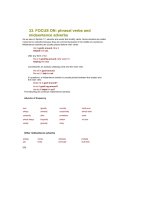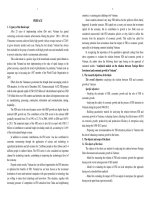Difference between conjunctions relative pronouns and relative adverbs
Bạn đang xem bản rút gọn của tài liệu. Xem và tải ngay bản đầy đủ của tài liệu tại đây (9.3 KB, 2 trang )
Difference between conjunctions, relative pronouns and relative
adverbs
Conjunctions
,
relative pronouns
and
relative adverbs
can be used to connect two clauses. The grammar is
different. Prepositions do not connect two clauses. They merely show the relationship between a noun/pronoun
and another word in the sentence.
Relative pronouns
Relative pronouns
are different from conjunctions. Relative pronouns are important connecting devices. They
not only connect two clauses but also act as the subject or object of the verb in the relative clause. This is the
main difference between conjunctions and relative pronouns. Conjunctions merely connect two clauses. They do
not serve any other purpose.
Study the sentences given below.
This is the letter. My mother sent me this letter.
We can connect these two clauses.
This is the letter
that my mother sent me.
Here the relative pronoun
that
replaces the phrase
this letter
and acts as the object of the verb
sent.
It is easy to
decide whether a relative pronoun is the subject or the object. When it is the object it will be immediately followed
by another noun which acts as the subject. In this case, the relative pronoun ‘that’ is followed by the noun ‘my
mother’ which acts as the subject.
Another example is given below.
This is the boy. He won the first prize.
This is the boy
who won the first prize.
Here the relative pronoun
who
replaces the pronoun
he
. It acts as the subject of the relative clause.
Relative adverb
The
relative adverb
not only modifies a verb, but also joins the two clauses in a sentence. Note that a relative
adverb does not act as the subject or object in the relative clause. It merely replaces an adverb.
This is the house. John lives here.
This is the house
where
John lives.
Here the relative adverb
where
replaces the place adverb
here
.
Another example is given below.
I first met Susie on that day. I will never forget that day.
I will never forget the day
when
I first met Susie.
Be first to know when grammar rules change! Sign up to our newsletter here: englishgrammar.org (It's free)
Powered by TCPDF (www.tcpdf.org)









